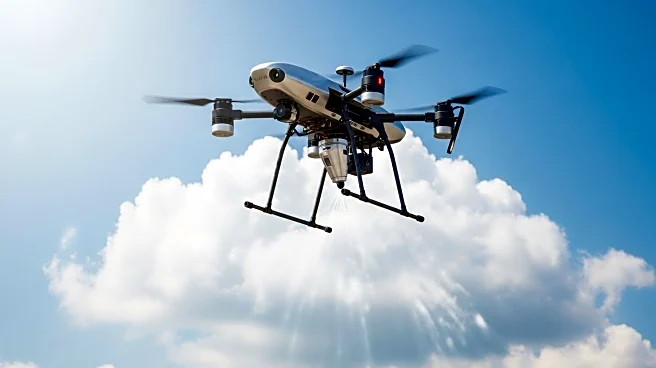What is the story about?
What's Happening?
Rainmaker Technology has proposed using small drones equipped with cloud-seeding flares to stimulate precipitation, a move that has drawn scrutiny from the Air Line Pilots Association (ALPA). The ALPA has urged the Federal Aviation Administration (FAA) to reject Rainmaker's request unless it adheres to stricter safety guidelines. The proposal involves deploying two types of flares on the Elijah quadcopter within controlled airspace, necessitating Air Traffic Control's permission. ALPA has raised concerns regarding safety risks, potential foreign object debris, and the environmental impact of the chemical agents used. They have highlighted the absence of trajectory modeling and environmental analysis in Rainmaker's petition. Rainmaker has responded by assuring that operations will be conducted over rural areas on private properties, aiming to improve the safety and effectiveness of cloud-seeding practices traditionally carried out by crewed airplanes.
Why It's Important?
The FAA's decision on Rainmaker's proposal is crucial for the future of weather modification using unmanned aerial systems. If approved, it could pave the way for innovative approaches to cloud-seeding, potentially enhancing precipitation in drought-stricken areas. However, the concerns raised by ALPA underscore the need for rigorous safety and environmental standards to prevent potential hazards. The outcome of this decision could influence regulatory frameworks for drone operations in controlled airspace, impacting both the aviation industry and environmental policy. Stakeholders such as agricultural sectors and environmental groups are closely monitoring the situation, as the implications of drone-based cloud-seeding could affect water resource management and ecological balance.
What's Next?
The FAA is expected to review Rainmaker's proposal and the concerns raised by ALPA before making a decision. This process may involve consultations with environmental experts and aviation safety authorities to address the highlighted risks. If the proposal is approved, Rainmaker will need to implement comprehensive safety measures and conduct environmental impact assessments. The decision could also prompt other companies to explore similar technologies, potentially leading to advancements in drone-based weather modification. Meanwhile, ALPA and other aviation stakeholders may continue advocating for stringent safety protocols to ensure the safe integration of drones into controlled airspace.
Beyond the Headlines
The ethical implications of using drones for weather modification are significant, as altering natural precipitation patterns could have unforeseen consequences on ecosystems and local climates. There is also a legal dimension regarding the use of private properties for such operations, which may require new regulations to balance property rights with environmental needs. Additionally, the cultural perception of drone technology in weather modification could shift, influencing public acceptance and policy development in the long term.
















